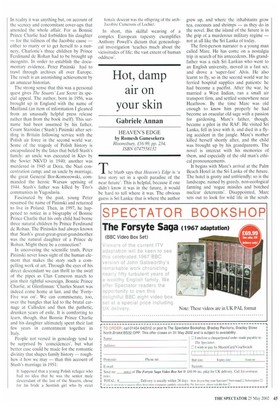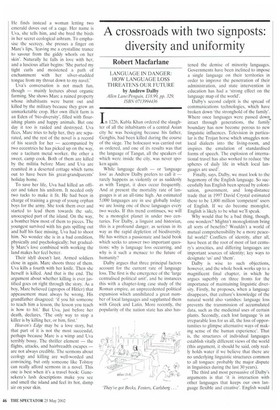Hot, damp air on your skin
Gabriele Annan
HEAVEN'S EDGE by Romesh Gunesekera
Bloomsbury, £16.99, pp. 234, ISBN 0747558132
The blurb says that Heaven's Edge is 'a love story set in a spoilt paradise of the near future'. This is helpful, because if one didn't know it was in the future, it would be hard to tell where it was. The obvious guess is Sri Lanka: that is where the author grew up, and where the inhabitants grow tea, coconuts and shrimps — as they do in the novel. But the island of the future is in the grip of a murderous military regime — not at all like the Sri Lanka of today.
The first-person narrator is a young man called Marc. He has come on a nostalgia trip in search of his antecedents. His grandfather was a rich Sri Lankan who went to an English university, moved in a fast set, and drove a 'super-fast' Alvis. He also learnt to fly, so in the second world war he ferried hospital supplies and patients: he had become a pacifist. After the war, he married a West Indian, ran a small air transport firm, and settled somewhere near Heathrow. By the time Marc was old enough to know him properly he had become an oracular old sage with a passion for gardening. Marc's father, though, became a pilot in the RAF. He visited Sri Lanka, fell in love with it, and died in a flying accident in the jungle. Marc's mother killed herself shortly after, and the child was brought up by his grandparents. The novel is intercut with his memories of them, and especially of the old man's ethical pronouncements.
It begins with Marc's arrival at the Palm Beach Hotel in the Sri Lanka of the future. The hotel is grotty and unfriendly; so is the landscape, ruined by greedy, non-ecological farming and 'rogue missiles and botched nuclear deterrents'. Disappointed, Marc sets out to look for wild life in the scrub. He finds instead a woman letting two emerald doves out of a cage. Her name is Uva, she tells him, and she bred the birds in her secret ecological ashram. To emphasise the secrecy, she presses a finger on Marc's lips, 'leaving me a crystalline trance to savour from the giddy whorls on her skin'. Naturally he falls in love with her, and a luscious affair begins: 'She parted my tight curls and moistened a path of enchantment with her silver-studded tongue from my throat down to my navel.'
Uva's conversation is not much fun, though mainly lectures about organic farming. She shows Marc a ruined property whose inhabitants were burnt out and killed by the military because they grew an unmarketable crop. Her own illicit farm is an Eden of 'No-diversity', filled with flourishing plants and happy animals. But one day it too is raided and destroyed. Uva flees, Marc tries to help her, they are separated, and the rest of the novel is a record of his search for her — accompanied by two eccentrics he has picked up on the way, one a taciturn metal worker, the other a sweet, camp cook. Both of them are killed by the militia before Marc and Uva are reunited in a deserted cottage which turns out to have been his great-grandparents' holiday home.
To save her life, Uva had killed an officer and taken his uniform. It needed only two tucks to make it fit. He had been in charge of training a group of young orphan boys for the army. She took them over and started to lead them towards the safe, unoccupied part of the island. On the way, a bomber blew most of them to pieces. The youngest survived with his guts spilling out and half his face missing. Uva had to shoot him. No wonder she is in a bad condition, physically and psychologically; but gradually Marc's love combined with working the land makes her feel better.
Their idyll doesn't last. Armed soldiers close in again. Marc shoots three of them. Uva kills a fourth with her knife. Then she herself is killed. And that is the end. The argument about whether killing is ever justified goes on right through the story. As a boy, Marc believed (apropos of Hitler) that appeasement must always be wrong. His grandfather disagreed: 'if you hit someone to teach him a lesson, the lesson you teach is how to hit.' But Uva, just before her death, declares, 'The only way to stop a killer is by killing her, or him, first.'
Heaven's Edge may be a love story, but that part of it is not the most successful, perhaps because Marc is a wimp and Uva terribly bossy. The thriller element — the flights, attacks, and hairbreadth escapes — are not always credible. The sermons about ecology and killing are well-worded and convincing, but only someone like Tolstoy can really afford sermons in a novel. This one is best when it's a travel book: Gunesekera's lush descriptions make you see and smell the island and feel its hot, damp air on your skin.























































































 Previous page
Previous page